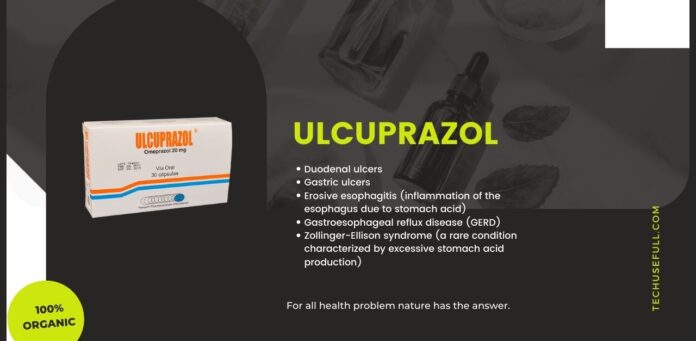Hey there, curious readers! Today, we’re diving into the world of Ulcuprazol, a superhero for your tummy!
Imagine this: sometimes, our tummies misbehave, causing things like heartburn, tummy aches, and more. That’s where Ulcuprazol steps in to save the day!
Ulcuprazol is like a magical shield that fights off the mean old stomach acid and helps make your tummy feel all better.
It’s so cool because it can stop tummy troubles and even prevent them from happening! Plus, it’s like your trusty sidekick, always there when you need it.
So, if you’re tired of tummy woes and want to know how Ulcuprazol can be your hero, keep reading! We’ll discover how it works, why it’s awesome, and how it can make your tummy feel like a champ again.
Let’s go on this exciting adventure together!
What Is Ulcuprazol?
Ulcuprazol, a proton pump inhibitor (PPI), is a medication designed to diminish stomach acid production by inhibiting the action of the enzyme known as the proton pump, responsible for acid secretion in the stomach.
This versatile medication finds utility in the treatment of various stomach and duodenal conditions, including:
- Duodenal ulcers
- Gastric ulcers
- Erosive esophagitis (inflammation of the esophagus due to stomach acid)
- Gastroesophageal reflux disease (GERD)
- Zollinger-Ellison syndrome (a rare condition characterized by excessive stomach acid production)
Additionally, it serves as a preventive measure against the formation of stomach ulcers in individuals taking nonsteroidal anti-inflammatory drugs (NSAIDs) like aspirin or ibuprofen.
Ulcuprazol is administered orally once a day, typically in the morning, and should be taken on an empty stomach, at least 30 minutes before any meal.
The duration of Ulcuprazol treatment typically spans 4-8 weeks, although it may be extended based on the specific medical condition being addressed.
In terms of safety, IT is generally well-tolerated.
Common, mild side effects may include headaches, nausea, diarrhea, and abdominal discomfort. However, severe side effects are exceptionally rare.
To ensure the safe and effective use of Ulcuprazol, it is vital to inform your healthcare provider about all medications you are currently taking, including over-the-counter drugs, vitamins, and herbal supplements.
It has the potential to interact with other medications, making it imperative that your doctor is aware of your complete medication regimen.
How Does Ulcuprazol Work?
Ulcuprazol functions by inhibiting the activity of the proton pump, an enzyme responsible for generating stomach acid.
This inhibition results in a reduction of stomach acid production, effectively alleviating symptoms associated with conditions like ulcers, GERD, and Zollinger-Ellison syndrome.
Belonging to the proton pump inhibitors (PPIs) class of drugs, Ulcuprazol is regarded as the most efficacious medication for decreasing stomach acid production.
These medications are known for their safety, high tolerance levels, and are frequently the initial choice for managing various stomach and duodenal conditions.
Here is a more comprehensive breakdown of Ulcuprazol’s mechanism of action:
Oral Administration:
Ulcuprazol is taken orally and subsequently absorbed into the bloodstream.
Stomach Targeting:
It travels to the stomach, where it forms a binding interaction with the proton pump.
Proton Pump Inhibition:
This binding effectively impedes the proton pump’s ability to generate stomach acid.
Acid Reduction:
Consequently, the production of stomach acid diminishes, resulting in symptom relief for conditions such as ulcers, GERD, and Zollinger-Ellison syndrome.
Ulcuprazol usually initiates its action within an hour after ingestion, with its full effect being realized within 4-5 days.
However, it’s worth noting that some conditions may require several weeks for symptoms to completely subside.
When taking Ulcuprazol, adhering to your doctor’s prescribed regimen is crucial.
Avoid discontinuing the medication without consulting your healthcare provider, even if you start to feel better, to ensure continued effectiveness and proper management of your condition.
Uses Of Ulcuprazol
Ulcuprazol, classified as a proton pump inhibitor (PPI), serves as a versatile treatment and preventive measure for a range of stomach and duodenal conditions, encompassing:
Duodenal Ulcers:
These painful sores develop along the digestive tract’s lining, specifically in the initial section of the small intestine known as the duodenum.
Gastric Ulcers:
Gastric ulcers manifest within the stomach’s lining, causing discomfort and potential complications.
Erosive Esophagitis:
This condition arises when the esophagus becomes inflamed due to exposure to stomach acid, leading to discomfort and pain.
Gastroesophageal Reflux Disease (GERD):
GERD, a persistent ailment, occurs when stomach acid regurgitates into the esophagus, causing heartburn and other symptoms.
Zollinger-Ellison Syndrome:
This rare disorder induces excessive stomach acid production, necessitating treatment to manage acid levels effectively.
Prevention Of Stomach Ulcers In Nsaid Users:
Nonsteroidal anti-inflammatory drugs (NSAIDs), like ibuprofen and aspirin, can irritate the stomach lining and trigger ulcer formation. It can be prescribed to prevent the development of stomach ulcers in individuals taking NSAIDs.
Typically, Ulcuprazol is administered once daily, spanning a course of 4-8 weeks, although the duration may extend depending on the specific condition under treatment.
Ulcuprazol is renowned for its safety and high tolerance levels, with common side effects remaining mild and including headaches, nausea, diarrhea, and abdominal discomfort. Serious side effects are exceedingly rare.
If you are contemplating the use of Ulcuprazol, it is essential to engage in a thorough discussion with your healthcare provider regarding potential risks and benefits.
As Ulcuprazol may interact with other medications, it is imperative to disclose your complete medication regimen to your doctor.
Note: Administering Ulcuprazol on an empty stomach, at least 30 minutes before meals, is vital for optimal effectiveness.
Pros And Cons:
| Pros | Cons |
| – Highly effective at reducing stomach acid production. | – Potential interactions with other medications; inform your doctor. |
| – Relieves symptoms of conditions like ulcers, GERD, and Zollinger-Ellison syndrome. | – Possible side effects like headache, nausea, diarrhea, and abdominal pain (usually mild and transient). |
| – Prevents stomach ulcers in NSAID users (e.g., ibuprofen, aspirin). | – Long-term PPI use (including ulcuprazol) is associated with increased risk of certain health issues (bone fractures, pneumonia, Clostridium difficile infection). |
Frequently Asked Questions (FAQs):
Is Ulcuprazol Safe For Long-Term Use?
Ulcuprazol is generally safe for both short-term and long-term use. However, long-term use should be monitored by a healthcare professional due to potential side effects.
Can I Take Ulcuprazol With Other Medications?
Discuss potential drug interactions with your doctor to ensure the safe use of Ulcuprazol alongside other medications.
Are There Dietary Restrictions While Taking Ulcuprazol?
While there are no strict dietary restrictions, it’s advisable to maintain a balanced diet for overall digestive health.
Conclusion:
In summary, Ulcuprazol is a powerful tool in managing digestive disorders, and understanding its uses, benefits, and precautions is essential for those seeking relief.
Ulcuprazol, a potent digestive aid, requires understanding its uses, benefits, precautions.
Consult your healthcare provider for personalized advice on usage and interactions.
Ulcuprazol, a trusted gastro medication, relieves GERD ulcers effectively. Its acid reduction promotes healing, aiding digestive health.
Always seek professional guidance for long-term use.
Embrace the possibilities of improved digestive health with Ulcuprazol, but always tread with wisdom and care.


